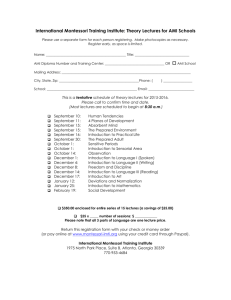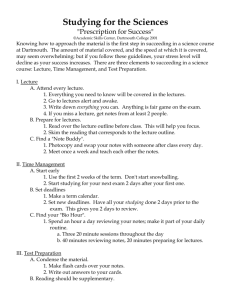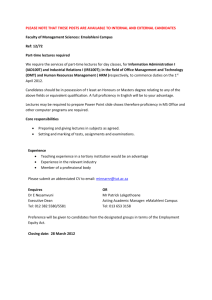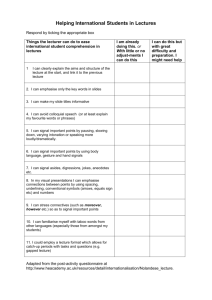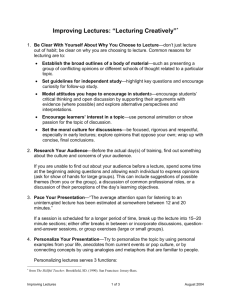ENCH 360 - Chemical and Process Engineering
advertisement
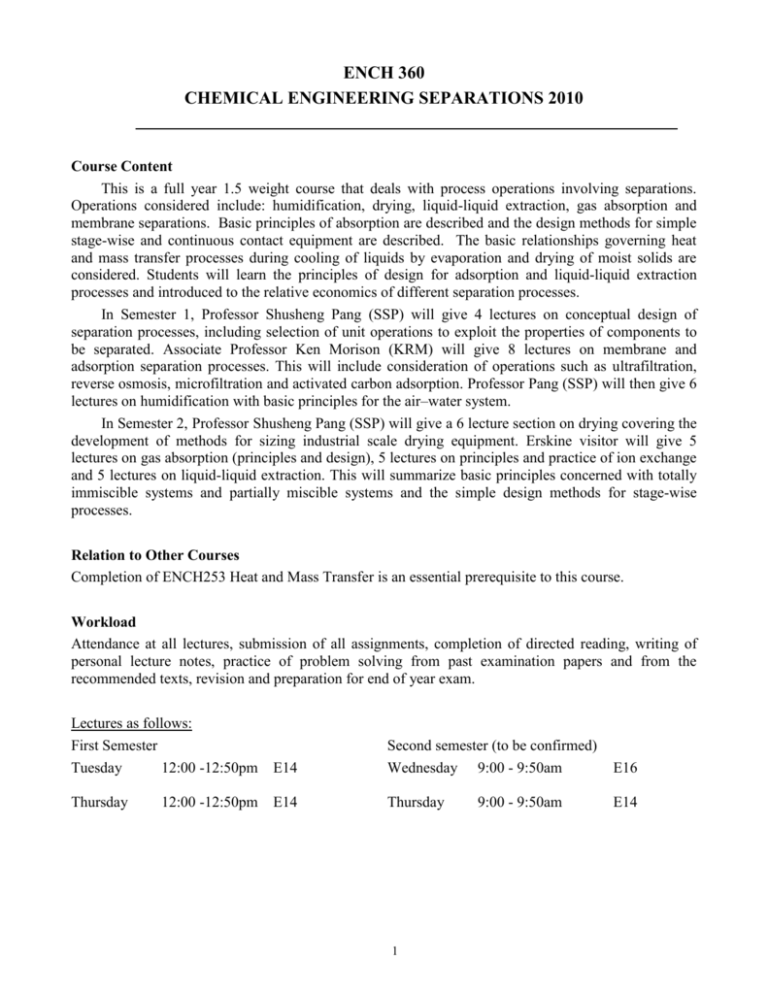
ENCH 360 CHEMICAL ENGINEERING SEPARATIONS 2010 Course Content This is a full year 1.5 weight course that deals with process operations involving separations. Operations considered include: humidification, drying, liquid-liquid extraction, gas absorption and membrane separations. Basic principles of absorption are described and the design methods for simple stage-wise and continuous contact equipment are described. The basic relationships governing heat and mass transfer processes during cooling of liquids by evaporation and drying of moist solids are considered. Students will learn the principles of design for adsorption and liquid-liquid extraction processes and introduced to the relative economics of different separation processes. In Semester 1, Professor Shusheng Pang (SSP) will give 4 lectures on conceptual design of separation processes, including selection of unit operations to exploit the properties of components to be separated. Associate Professor Ken Morison (KRM) will give 8 lectures on membrane and adsorption separation processes. This will include consideration of operations such as ultrafiltration, reverse osmosis, microfiltration and activated carbon adsorption. Professor Pang (SSP) will then give 6 lectures on humidification with basic principles for the air–water system. In Semester 2, Professor Shusheng Pang (SSP) will give a 6 lecture section on drying covering the development of methods for sizing industrial scale drying equipment. Erskine visitor will give 5 lectures on gas absorption (principles and design), 5 lectures on principles and practice of ion exchange and 5 lectures on liquid-liquid extraction. This will summarize basic principles concerned with totally immiscible systems and partially miscible systems and the simple design methods for stage-wise processes. Relation to Other Courses Completion of ENCH253 Heat and Mass Transfer is an essential prerequisite to this course. Workload Attendance at all lectures, submission of all assignments, completion of directed reading, writing of personal lecture notes, practice of problem solving from past examination papers and from the recommended texts, revision and preparation for end of year exam. Lectures as follows: First Semester Tuesday 12:00 -12:50pm Thursday 12:00 -12:50pm E14 Second semester (to be confirmed) Wednesday 9:00 - 9:50am E16 E14 Thursday E14 1 9:00 - 9:50am Assessment Assign 1 Assign 2 Assign 3 Assign 4 MidY Test EY Exam Issue KRM 17 Mar SSP 4 May Erskine/SSP 14 Sept Erskine 14 Oct SSP/KRM tba SSP/Erskine tba Due 27 Apr 25 May 5 Oct %wt 5 7.5 10 7.5 30 40 No extensions are permitted except on medical certificate or compassionate grounds. Materials Recommended texts for directed reading: Coulson J M, Richardson, J F, Backhurst, J R, Harker, J H Chemical Engineering, Volume 2, 3rd Edition, Pergamon, 1999 Library ref: TP 155 .C855 1999 Coulson, J M, Richardson, J F, Sinnott, R K Chemical Engineering, Volume 6, 3rd Edition, Pergamon, 1999 TP 155 .C855 1999 Treybal, R E Mass Transfer Operations, 3rd edition, McGraw Hill, 1980 Library Ref: TP 156 .M3.T817 Lecturers Professor Shusheng Pang, Room D554, S R Siemon Building (Course Coordinator) Extn. 6538, email: shusheng.pang@canterbury.ac.nz Associate Professor Ken Morison, Room D462, S R Siemon Building Extn 6578, email ken.morison@canterbury.ac.nz Topics Conceptual design, liquid-liquid extraction, psychrometrics, evaporative cooling, drying of solids, hydraulic design of plate and packed absorption columns, membrane separation processes, adsorption and ion exchange. Students Repeating the Course Contact the Course Co-ordinator. Concerns Students with concerns about the course should contact either of the lecturers listed above, the 2nd Pro Director of Studies or the Head of Department. General Policies of the Department Students may obtain the general policies of the University on matters such as the aegrotat applications, appeals procedures, reconsideration of grades and special provision for students with disabilities from the University Calendar. The Departmental assessment details are distributed to the students at the beginning of the year. Last updated 8 March 2010 2



